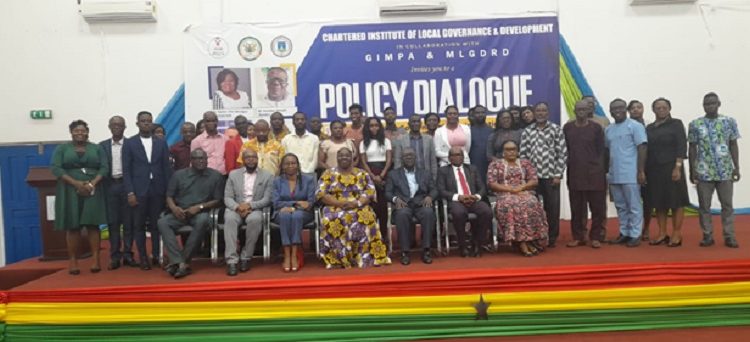O.B Amoah (M) with some participants at the dialogue
Local government practitioners have resolved to work closely with each other to help strengthen local governance as part of decentralisation in order to improve public delivery for sustainable development.
The practitioners made this known at the maiden edition of a policy dialogue organised by the Chartered Institute of Local Governance and Development (CILGD), in collaboration with GIMPA and Ministry of Local Government on Tuesday in Accra.
Minister of State, O.B Amoah said the return to constitutional rule in 1992 has reinforced the nation’s resolve to persue decentralisation and local governance as a key policy for achieving the local and economic objectives of the state.
According to the minister, governments over the years have pursued major programmes and projects across the country to improve urban management and basic urban services in the municipal assemblies.
Head of Local Government Service, Ing. Dr. Ato Arthur, stated that though local government has transitioned with structures such as Local Government Service since the Acts were established 35 years ago, local assemblies could do better if challenges such as poor coordination among actors in the development space, duplication of functions, and conflict in the various laws among others were addressed.
He noted that in spite of all those challenges, government is close to the governed, citizens have become discerning and demand accountability from duty bearers with popular participation at the lower level, while government with the support of the Metropolitan, Municipal and District Assemblies (MMDAs) have embarked on numerous development projects as well.
Acting Chief Executive of the Land Use and Spatial Planning Authority (LUPSA), Kwadwo Yeboah, who underscored the importance of spatial planning across the country, mentioned how most people over the years have disregarded planning as a prerequisite.
He said out of the 261 MMDAs, only 32 of them have spatial planning framework though they are mandated by law to do so, while advising them to enforce the laws related to spatial planning in their respective areas.
Chairperson for the event, Dr. Esther Offei Aboagye, who traced the development of decentralisation said Assembly system has proved its worth for it to be included in the Fourth Republican Constitution.
She noted that after 35 years, it has become part of a multi party democratic environment where local administrations have become independent social and economic vehicles for development.
Present at the policy dialogue which was under the theme “35 years of local government administration in Ghana: How thus far (Successes and the way forward)” also include local government practitioners, experts, lecturers, MMDCEs, some Assembly members, Presiding members as well as students.
By Ebenezer K. Amponsah


